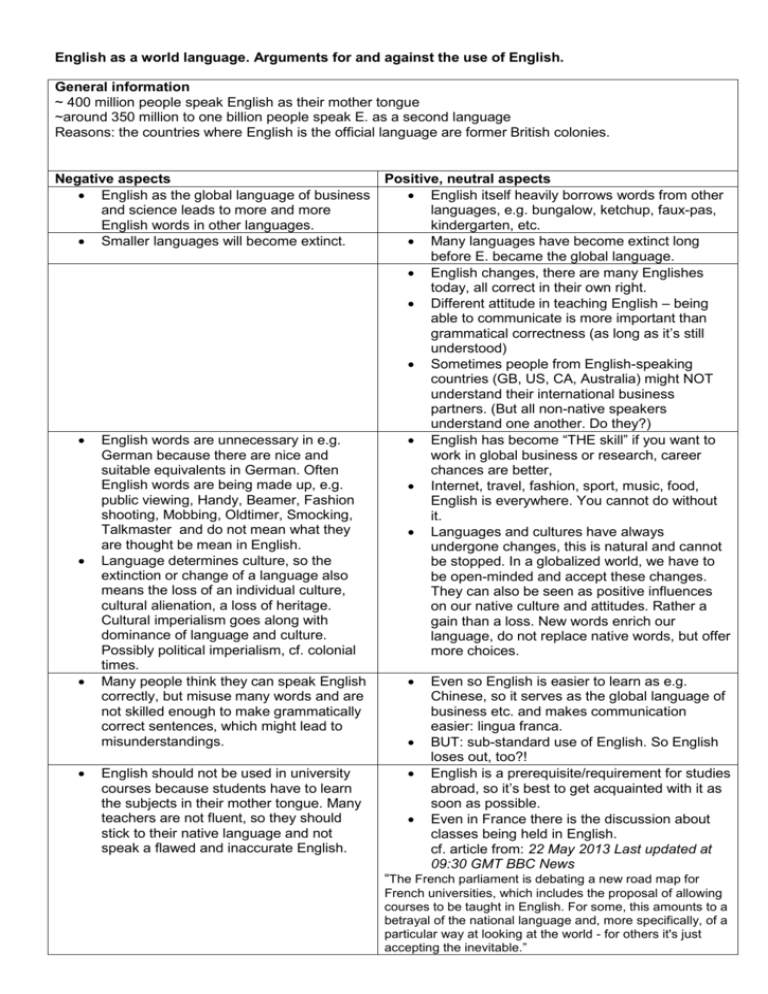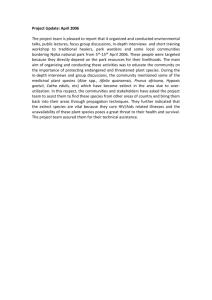English as a World Language: Arguments For and Against
advertisement

English as a world language. Arguments for and against the use of English. General information ~ 400 million people speak English as their mother tongue ~around 350 million to one billion people speak E. as a second language Reasons: the countries where English is the official language are former British colonies. Negative aspects English as the global language of business and science leads to more and more English words in other languages. Smaller languages will become extinct. English words are unnecessary in e.g. German because there are nice and suitable equivalents in German. Often English words are being made up, e.g. public viewing, Handy, Beamer, Fashion shooting, Mobbing, Oldtimer, Smocking, Talkmaster and do not mean what they are thought be mean in English. Language determines culture, so the extinction or change of a language also means the loss of an individual culture, cultural alienation, a loss of heritage. Cultural imperialism goes along with dominance of language and culture. Possibly political imperialism, cf. colonial times. Many people think they can speak English correctly, but misuse many words and are not skilled enough to make grammatically correct sentences, which might lead to misunderstandings. English should not be used in university courses because students have to learn the subjects in their mother tongue. Many teachers are not fluent, so they should stick to their native language and not speak a flawed and inaccurate English. Positive, neutral aspects English itself heavily borrows words from other languages, e.g. bungalow, ketchup, faux-pas, kindergarten, etc. Many languages have become extinct long before E. became the global language. English changes, there are many Englishes today, all correct in their own right. Different attitude in teaching English – being able to communicate is more important than grammatical correctness (as long as it’s still understood) Sometimes people from English-speaking countries (GB, US, CA, Australia) might NOT understand their international business partners. (But all non-native speakers understand one another. Do they?) English has become “THE skill” if you want to work in global business or research, career chances are better, Internet, travel, fashion, sport, music, food, English is everywhere. You cannot do without it. Languages and cultures have always undergone changes, this is natural and cannot be stopped. In a globalized world, we have to be open-minded and accept these changes. They can also be seen as positive influences on our native culture and attitudes. Rather a gain than a loss. New words enrich our language, do not replace native words, but offer more choices. Even so English is easier to learn as e.g. Chinese, so it serves as the global language of business etc. and makes communication easier: lingua franca. BUT: sub-standard use of English. So English loses out, too?! English is a prerequisite/requirement for studies abroad, so it’s best to get acquainted with it as soon as possible. Even in France there is the discussion about classes being held in English. cf. article from: 22 May 2013 Last updated at 09:30 GMT BBC News “The French parliament is debating a new road map for French universities, which includes the proposal of allowing courses to be taught in English. For some, this amounts to a betrayal of the national language and, more specifically, of a particular way at looking at the world - for others it's just accepting the inevitable.”











